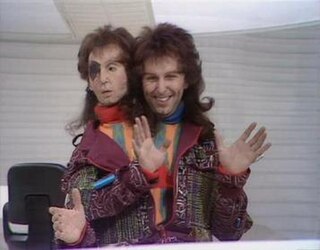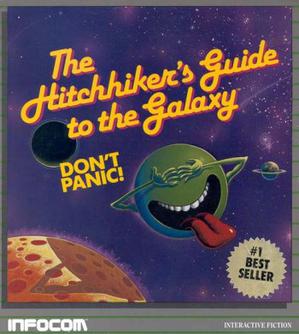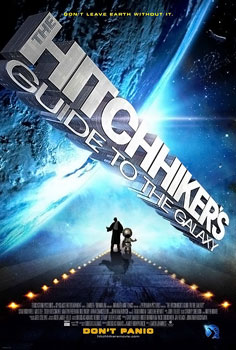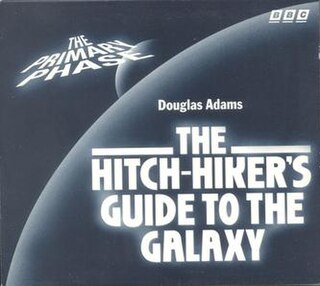
The Hitchhiker's Guide to the Galaxy is a comedy science fiction franchise created by Douglas Adams. Originally a 1978 radio comedy broadcast on BBC Radio 4, it was later adapted to other formats, including novels, stage shows, comic books, a 1981 TV series, a 1984 text adventure game, and 2005 feature film.

Mostly Harmless is a 1992 novel by Douglas Adams and the fifth book in the Hitchhiker's Guide to the Galaxy series. It is described on the cover of the first edition as "The fifth book in the increasingly inaccurately named Hitchhikers Trilogy". It was the last Hitchhiker's book written by Adams and his final book released in his lifetime.

Ford Prefect is a fictional character in The Hitchhiker's Guide to the Galaxy by the British author Douglas Adams. His role as Arthur Dent's friend – and rescuer, when the Earth is unexpectedly demolished to make way for a hyperspace bypass at the start of the story – is often expository, as Ford is an experienced galactic hitchhiker and explains that he is actually an alien journalist, a field researcher for the titular Guide itself, and not an out-of-work actor from Guildford as he had claimed.

Zaphod Beeblebrox is a fictional character in the various versions of the comic science fiction series The Hitchhiker's Guide to the Galaxy by Douglas Adams.

Marvin the Paranoid Android is a fictional character in The Hitchhiker's Guide to the Galaxy series by Douglas Adams. Marvin is the ship's robot aboard the starship Heart of Gold. Originally built as one of many failed prototypes of Sirius Cybernetics Corporation's GPP technology, Marvin is afflicted with severe depression and boredom, in part because he has a "brain the size of a planet" which he is seldom, if ever, given the chance to use. Instead, the crew request him merely to carry out mundane jobs such as "opening the door". Indeed, the true horror of Marvin's existence is that no task he could be given would occupy even the tiniest fraction of his vast intellect. Marvin claims he is 50,000 times more intelligent than a human, though this is, if anything, an underestimation. When kidnapped by the bellicose Krikkit robots and tied to the interfaces of their intelligent war computer, Marvin simultaneously manages to plan the entire planet's military strategy, solve "all of the major mathematical, physical, chemical, biological, sociological, philosophical, etymological, meteorological and psychological problems of the Universe, except his own, three times over", and compose several lullabies.

Arthur Philip Dent is a fictional character and the hapless protagonist of the comic science fiction series The Hitchhiker's Guide to the Galaxy by Douglas Adams.

Tricia Marie McMillan, also known as Trillian Astra, is a fictional character from Douglas Adams' series The Hitchhiker's Guide to the Galaxy. She is most commonly referred to simply as "Trillian", a modification of her birth name, which she adopted because it sounded more "space-like". According to the movie version, her middle name is Marie. Physically, she is described as "a slim, darkish humanoid, with long waves of black hair, a full mouth, an odd little knob of a nose and ridiculously brown eyes," looking "vaguely Arabic."

Life, the Universe and Everything is the third book in the six-volume Hitchhiker's Guide to the Galaxy science fiction "trilogy of six books" by British writer Douglas Adams. The title refers to the Answer to Life, the Universe, and Everything.

The Restaurant at the End of the Universe is the second book in the Hitchhiker's Guide to the Galaxy science fiction comedy "trilogy" by Douglas Adams. It was originally published by Pan Books as a paperback in 1980. Like the preceding novel, it was adapted from Adams' radio series, and became a critically acclaimed cult classic.

The Hitchhiker's Guide to the Galaxy is an interactive fiction video game based on the comedic science fiction series of the same name. It was designed by series creator Douglas Adams and Infocom's Steve Meretzky, and it was first released in 1984 for the Apple II, Mac, Commodore 64, CP/M, MS-DOS, Amiga, Atari 8-bit computers, and Atari ST. It is Infocom's fourteenth game.
"Young Zaphod Plays It Safe" is a short story by Douglas Adams set in his The Hitchhiker's Guide to the Galaxy universe. It is included with several collections but has never been released as a standalone work. It first appeared in The Utterly Utterly Merry Comic Relief Christmas Book (1986) which Adams also co-edited. A slightly revised version appeared in the 1996 anthology The Wizards of Odd, edited by Peter Haining. The story then appeared in some omnibus editions of The Hitchhiker's Guide to the Galaxy, as well as the Adams retrospective The Salmon of Doubt, and the 2013 anthology The Time Traveler's Almanac.

The Hitchhiker's Guide to the Galaxy is the first book in the Hitchhiker's Guide to the Galaxy comedy science fiction "trilogy of five books" by Douglas Adams, with a sixth book written by Eoin Colfer. The novel is an adaptation of the first four parts of Adams's radio series of the same name, centering on the adventures of the only man to survive the destruction of Earth; while roaming outer space, he comes to learn the truth behind Earth's existence. The novel was first published in London on 12 October 1979. It sold 250,000 copies in the first three months.

The Hitchhiker's Guide to the Galaxy is a 2005 science fiction comedy film directed by Garth Jennings, based upon the Hitchhiker's Guide to the Galaxy series created by Douglas Adams. It stars Martin Freeman, Sam Rockwell, Mos Def, Zooey Deschanel, Bill Nighy, Anna Chancellor, and John Malkovich, and the voices of Stephen Fry, Helen Mirren, Richard Griffiths, Thomas Lennon, Ian McNeice, and Alan Rickman. Adams co-wrote the screenplay with Karey Kirkpatrick but Adams died in 2001, before production began, therefore the film is dedicated to him. The film received mainly positive reviews and grossed over $100 million worldwide.

The Hitchhiker's Guide to the Galaxy is a science fiction comedy radio series primarily written by Douglas Adams. It was originally broadcast in the United Kingdom by BBC Radio 4 in 1978, and afterwards the BBC World Service, National Public Radio in the US and CBC Radio in Canada. The series was the first radio comedy programme to be produced in stereo, and was innovative in its use of music and sound effects, winning a number of awards.

The Hitchhiker's Guide to the Galaxy is a BBC television adaptation of Douglas Adams' The Hitchhiker's Guide to the Galaxy which aired between 5 January and 9 February 1981 on BBC2 in the United Kingdom. The adaptation follows the original radio series in 1978 and 1980, the first novel and double LP, in 1979, and the stage shows, in 1979 and 1980, making it the fifth iteration of the guide.

The terms Primary Phase and Secondary Phase describe the first two radio series of The Hitchhiker's Guide to the Galaxy, first broadcast in 1978. These were the first incarnations of the Hitchhiker's Guide to the Galaxy franchise. Both were written by Douglas Adams and consist of six episodes each.
The Tertiary Phase, Quandary Phase, Quintessential Phase and Hexagonal Phase are respectively the third, fourth, fifth and sixth series of The Hitchhiker's Guide to the Galaxy radio series. Produced in 2003, 2004 and 2018 by Above the Title Productions for BBC Radio 4, they are radio adaptations of the third, fourth, fifth and sixth books in Douglas Adams' The Hitchhiker's Guide to the Galaxy series: Life, the Universe and Everything; So Long, and Thanks For All the Fish; Mostly Harmless and And Another Thing....

The Hitchhiker's Guide to the Galaxy is a fictional electronic guide book in the multimedia scifi/comedy series of the same name by Douglas Adams. The Guide serves as "the standard repository for all knowledge and wisdom" for many members of the series' galaxy-spanning civilization. Entries from the guidebook are used as comic narration to bridge events and provide background information in every version of the story. The guide is published by "Megadodo Publications", a publishing company on Ursa Minor Beta, and it is written and edited by many characters throughout the series.

And Another Thing... is the sixth and final installment of Douglas Adams' The Hitchhiker's Guide to the Galaxy "trilogy of six books". The book, written by Eoin Colfer was published on the thirtieth anniversary of the first book, 12 October 2009, in hardback. It was published by Penguin Books in the UK and by Hyperion Books in the US. Colfer was given permission to write the book by Adams' widow Jane Belson.



















